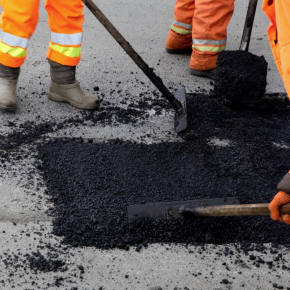
Aggregate Industries urge importance of asphalt innovation to utilities firms
With the government’s recent push to impose tougher road repair standards, Aggregate Industries is urging utilities firms to make better use of emerging asphalt innovations, in order to keep roads pothole-free for longer.
Last month, the Department for Transport (DfT) launched a consultation proposing that gas, electricity and communications firms must fix potholes which form within five years of work that requires breaking and repairing a road – this would be an increase to the current two-year guarantee.
This comes amid growing concerns about the deteriorating state of local roads – research recently released by the Asphalt Industry Alliance (AIA) reveals the number of potholes filled in over the last year jumped by a quarter, from 1.5 million in 2018 to 1.86 million in 2019 (so far).
Utilities openings in England and Wales are also up nearly 10% over the same period, to over two million.
The DfT hopes the new standards will push contractors, working on behalf of utilities firms, to use better quality asphalt materials – a move Aggregate says will be vital to extending the current lifetime of road repairs.
According to the leading construction materials supplier, this includes making use of the latest advances in asphalt such as SuperCurve, a high performance 10mm polymer modified asphalt, which has been specifically designed and engineered to provide an enhanced surface course for higher stressed areas.
A spokesperson on behalf of Aggregate Industries commented: “With cash-strapped local authorities spending an average of £1.1m – or 8% – of their annual road maintenance budgets on addressing premature maintenance arising from utilities openings, it is encouraging to see the government looking at ways to reduce this cost-burden by raising road repair standards.
“Opening a road to create a trench can reduce its structural life by up to 30%, and with so the advice to contractors and utilities firms is to adopt toughened asphalt solutions early on as this will be key to guaranteeing that roads remain pothole-free for longer.”
In line with recommendations made by the AIA, Aggregate is also calling on the government to create a more robust investment strategy for maintaining the long-term condition of local roads through regularly resurfacing programmes, which it says is the best way to prevent potholes from forming.
Chris Hudson, MD of Asphalt and Readymix at Aggregate Industries, added: “Potholes are symptomatic of poorly maintained roads and potential underlying structural issues.
“All councils have seen a significant decrease in road surfacing frequency in recent years to once every 67 years when ideally they should be resurfaced between 10-20 years.
“Rather than having a reactive programme of providing local authorities with last-minute funding to patch up potholes after bouts of bad weather, what we as an industry really need is a long-term funding framework.
“Crucially, this will allow councils to implement a full resurfacing programme, which will go a long way in preventing potholes from forming in the first place.”
Visit the Aggregate Industries website
Visit Supplier's page
Latest news

18th December 2024
BMBI: October Merchant sales rally with a +7.3% month-on-month increase
The latest Builders Merchant Building Index (BMBI) report shows builders’ merchants’ value sales in October were up +1.2% compared to the same month last year.
Posted in Articles, Bathrooms & Toilets, Bricks & Blocks, Building Associations & Institutes, Building Industry News, Building Products & Structures, Building Services, Building Systems, Civil Engineering, Cladding, Concrete, Cement, Admixtures, Drainage, Drainage Services, Floors, Garden, Hand Tools, Hard Landscaping & Walkways, Health & Safety, Heating Systems, Controls and Management, Heating, Ventilation and Air Conditioning - HVAC, Information Technology, Interior Design & Construction, Interiors, Landscaping, news, Paints, Paints, Coatings & Finishes, Pipes, Pipes & Fittings, Plant, Equipment and Hire, Plumbing, Power Tools, Publications, Research & Materials Testing, Restoration & Refurbishment, Retrofit & Renovation, Site Preparation, Sustainability & Energy Efficiency, Timber Buildings and Timber Products, Walls, Waste Management & Recycling
18th December 2024
GEZE UK announce Kids' Village charity partnership
Kids’ Village is delighted to have partnered with GEZE UK as their 2025 charity of the year – find out more via the article…
Posted in Access Control & Door Entry Systems, Architectural Ironmongery, Articles, Building Industry Events, Building Industry News, Building Products & Structures, Building Services, Charity work, Doors, Facility Management & Building Services, Health & Safety, Restoration & Refurbishment, Retrofit & Renovation, Security and Fire Protection, Windows
18th December 2024
Encon Achieves 5% Club Silver Membership
The Encon Group, the leading independent distributor of building materials, is pleased to announce that it has been awarded Silver membership of The 5% Club by the 2024/25 Employer Audit Scheme.
Posted in Articles, Awards, Bricks & Blocks, Building Associations & Institutes, Building Industry Events, Building Industry News, Building Products & Structures, Building Regulations & Accreditations, Building Services, Building Systems, Civil Engineering, Cladding, Concrete, Cement, Admixtures, Facades, Hard Landscaping & Walkways, Health & Safety, Insulation, Landscaping, Plant, Equipment and Hire, Recruitment, Restoration & Refurbishment, Retrofit & Renovation, Site Preparation, Training, Walls
18th December 2024
SWA: A focus on Steel Window Association member West Leigh
Located in Charlton, South London, SWA member West Leigh was established during the Blitz, in 1943. During the destruction in London, the company helped in repairing windows and facades that had been damaged by bombings throughout the city.
Posted in Articles, Building Associations & Institutes, Building Industry News, Building Products & Structures, Building Services, Building Systems, Case Studies, Facades, Glass, Glazing, Restoration & Refurbishment, Retrofit & Renovation, Steel and Structural Frames, Walls, Windows
 Sign up:
Sign up: